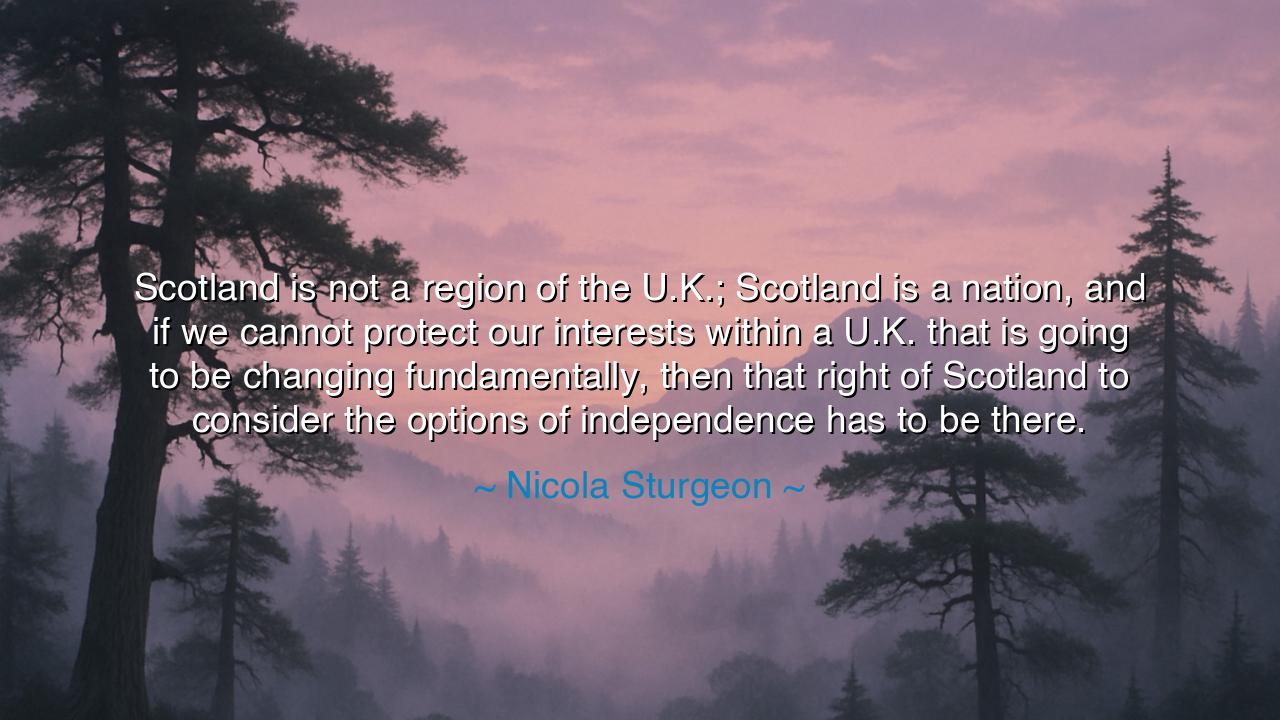
Scotland is not a region of the U.K.; Scotland is a nation, and
Scotland is not a region of the U.K.; Scotland is a nation, and if we cannot protect our interests within a U.K. that is going to be changing fundamentally, then that right of Scotland to consider the options of independence has to be there.






Hear, O children of the future, the words of Nicola Sturgeon, who speaks not just for a land, but for the soul of a people, for their right to self-determination, for the deep, unyielding desire of a nation to live on its own terms. She declares, "Scotland is not a region of the U.K.; Scotland is a nation, and if we cannot protect our interests within a U.K. that is going to be changing fundamentally, then that right of Scotland to consider the options of independence has to be there." In these words, she calls upon the ancient spirit of self-determination, a right that has been fought for across the ages, by those who knew that identity, freedom, and sovereignty could never be sacrificed to the whims of another.
The desire for independence is as old as civilization itself. In the ancient world, when kingdoms and empires sought to expand their dominion, the question of self-rule was one of profound importance. The Greeks, who cherished their city-states and their autonomy, fought fiercely against the might of the Persian Empire in the Greco-Persian Wars. The Battle of Marathon was not just a victory in battle, but a victory for self-determination, for the right of a people to live freely, to preserve their identity, and to decide their own future. Scotland, like Greece, stands as a nation, not a mere province, whose will to live independently must be honored.
Sturgeon’s statement draws a line between the U.K., a union that once promised stability and security, and the evolving landscape of the modern world. As nations change, as the foundations of old alliances shift, the question of whether Scotland can protect its interests within this new, fundamentally altered union becomes crucial. The U.K. itself is undergoing a transformation, notably through events like Brexit, which has redefined the relationship between the nations within the kingdom. In these times of change, Sturgeon argues, the right of Scotland to consider independence is no longer just a political issue; it is a moral imperative. A nation that cannot protect its own future, that is forced to stand on the sidelines of its own destiny, must have the right to decide for itself.
The story of the Irish struggle for independence serves as a powerful parallel to Scotland’s own journey. For centuries, the Irish fought for self-rule, enduring hardships and betrayals, their identity and freedom denied by foreign rulers. But through unrelenting perseverance, they finally secured their independence. Their fight was not just for land, but for the right to be recognized as a nation, with the sovereignty to determine their own path. Scotland shares this heritage, as a people who have long known what it means to be denied the full fruits of independence, and now stand at a crossroads, questioning whether to remain in a union that no longer serves them or to strike out on their own.
The wisdom of Sturgeon’s words is that independence is not a matter of pride or rebellion, but of necessity—the necessity of preserving a nation's right to choose its future. To be a nation is to have the right to determine your own path, to make your own decisions, and to protect the interests of your people. If the bonds of union no longer serve the interests of Scotland, if they no longer safeguard the future of the people, then Scotland must have the right to decide whether to remain within the U.K. or to pursue the independence that has been their birthright.
In our own lives, O children, Sturgeon’s lesson is one of deep importance: we must never let others define our identity, nor should we allow external forces to dictate our future. Whether as individuals or as communities, we must have the right to choose our own path, to protect our interests, and to make decisions that will secure our future. Independence is not about rejecting others, but about recognizing our inherent right to shape our own destiny, to stand firm in the face of adversity, and to honor the spirit of self-determination that has guided peoples through the ages.
Take this wisdom into your hearts: just as Scotland seeks to preserve its identity and its right to determine its future, so too must you stand firm in your own lives. Know that the greatest freedom lies not in dependence or submission, but in the courage to choose your own way. When the world shifts and changes around you, when the forces of history seem to move in directions that threaten your sense of self, remember that the right to choose is the greatest power you hold. Stand tall, for like the people of Scotland, you too have the right to define your own path, to live as you see fit, and to create a future worthy of your dreams.






AAdministratorAdministrator
Welcome, honored guests. Please leave a comment, we will respond soon